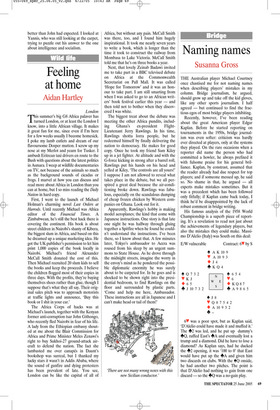Feeling at home
Aidan Hartley
London This summer’s big G8 Africa palaver has turned London, or at least the London I know, into a little African village. It makes it great fun for me, since even if I’m here for a few weeks usually I become homesick. I poke my lamb cutlets and dream of our flavoursome Dorper mutton. I screw up my nose at my Merlot and yearn for Tusker. I ambush Eritrean taxi drivers en route to the Bush with questions about the latest politics in Asmara. I weep at wildlife documentaries on TV, not because of the animals so much as the background sounds of cicadas or frogs. I marvel at how you can discuss and read more about Africa in London than you can at home, but I so miss reading the Daily Nation in hard copy.
First, I went to the launch of Michael Holman’s charming novel Last Orders at Harrods. Until recently Michael was Africa editor of the Financial Times. A Zimbabwean, he’s still the best hack there is covering the continent. His book is about street children in Nairobi’s shanty of Kibera, the biggest slum in Africa, and based on this he dreamed up a unique marketing idea. He got the UK publisher’s permission to let him print 1,000 copies of the book locally in Nairobi. Michael’s friend Alexander McCall Smith donated the cost of this. Then Michael recruited 20 slum kids to sell the books and keep the proceeds. I believe the children flogged most of their copies in three days. With the profits, they’re buying themselves shoes rather than glue, though I suppose that’s what they all say. Their original sales pitch was to approach motorists at traffic lights and announce, ‘Buy this book or I shit in your car.’ The Africa Corps of hacks was at Michael’s launch, together with the Kenyan former anti-corruption tsar John Githongo, who recently fled Nairobi in fear of his life. A lady from the Ethiopian embassy shouted at me about the Blair Commission for Africa and Prime Minister Meles Zenawi’s right to buy Sukhoi-27 ground-attack aircraft to defend the nation. The fact she lambasted me over canapés in Daunt’s bookshop was surreal, but I thanked my lucky stars it wasn’t in Addis Ababa, where the sound of gunfire and dying protesters has been prevalent of late. You see, London can be like the capital of all of Africa, but without any pain. McCall Smith was there, too, and I found him hugely inspirational. It took me nearly seven years to write a book, which is longer than the time it took to construct the railway from Mombasa to Lake Victoria. McCall Smith told me that he’s on three books a year.
Next, that lovely Zeinab Badawi invited me to take part in a BBC televised debate on Africa at the Commonwealth Secretariat on Pall Mall. It was called ‘Hope for Tomorrow’ and it was an honour to take part. I am still smarting from when I was asked to go to an African writers’ book festival earlier this year — and then told not to bother when they discovered I was white.
The biggest treat about the debate was meeting the other Africa pundits, including Ghana’s ex-president FlightLieutenant Jerry Rawlings. In his time, Rawlings shotta lorra people, but he redeemed himself by finally delivering the nation to democracy. He makes for good copy. Once he took my friend Sam Kiley up in a jet fighter. At altitude and with the G-force kicking in strong after a barrel roll, Rawlings put his hands on his head and yelled at Kiley, ‘The controls are all yours!’ I suppose I am not allowed to reveal what takes place in the debate, but we all perspired a great deal because the air-conditioning broke down. Rawlings was fabulous, especially on the scandalous dumping of cheap frozen chicken by Western companies on Ghana. Look out for it.
Apparently, Rawlings’s hobby is making model aeroplanes; the kind that come with Japanese instructions. One story is that late one night he was halfway through gluing together a Spitfire when he found he couldn’t understand the instructions. I’ve been there, so I know about that. A few minutes later, Tokyo’s ambassador to Accra was roused from his sleep by an urgent summons to State House. As he drove through the midnight streets, imagine the worry in the envoy’s mind as he pondered the possible diplomatic enormity he was surely about to be carpeted for. In he goes and is shocked to be shown right into the presidential bedroom, to find Rawlings on the floor and surrounded by plastic parts. ‘Come and help me here, Ambassador. These instructions are all in Japanese and I can’t make head or tail of them!’


































































 Previous page
Previous page